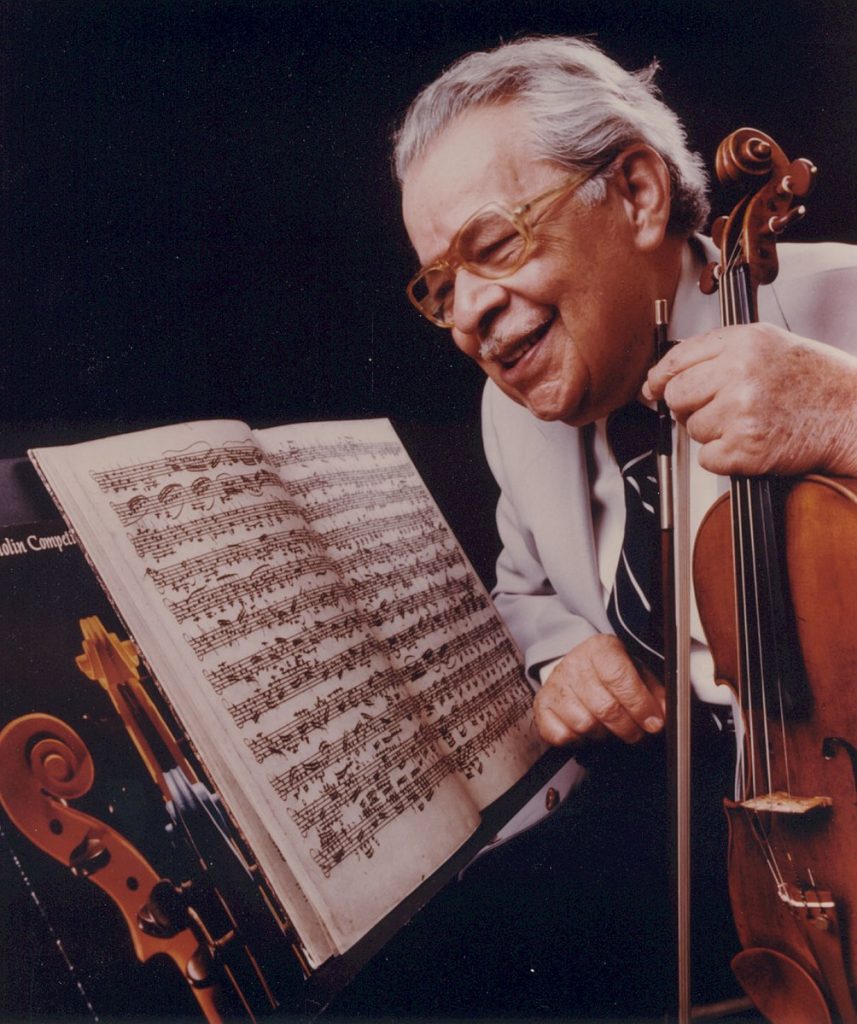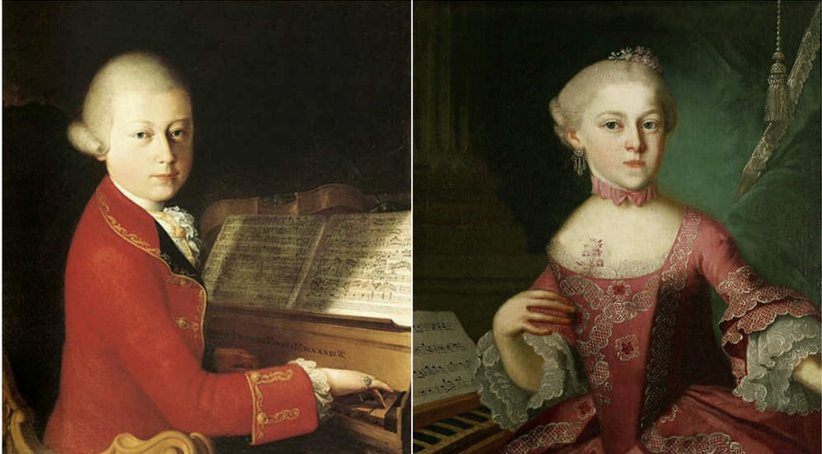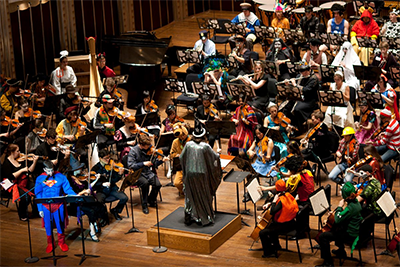By Daniel Hathaway
On Saturday at 5pm, the University of Michigan Men’s Glee Club, Mark Stover, director, will join the Brass Choir from Firestone Community Learning Center, Akron in a concert at St. Paul’s Lutheran in Massillon.
Sunday will feature four orchestra concerts. The Cleveland Institute of Music Orchestra will don costumes for a “Halloween Spooktacular” at Severance Music Center at 2 pm (pictured), the same hour when more than 40 musicians of The Cleveland Orchestra and friends will begin playing A Day of Music for Israel at Temple Tifereth Israel (music continues until 8 pm).
At 3:30 pm, Domenico Boyagian will lead the Suburban Symphony in music from the British Isles at Beechwood High School Auditorium, and at 4 pm, Steven Smith and Cleveland Chamber Symphony will perform Marta Ptaszyńska’s Flute Concerto with Sean Gabriel, Charles Ives’ Set for Theatre Orchestra, and Christopher Auerbach-Brown’s Constellation No. 6 – The Cicadas in Gamble Auditorium at Baldwin Wallace.
Also on Sunday at 4, members of BlueWater Chamber Orchestra (Andrea Belding & Nancy Patterson, violins, James Rhodes, viola & Kent Collier, cello), will play Arriaga, Gershwin & Mendelssohn at St. Noel in Willoughby Hills.
For details, visit our Concert Listing
INTERESTING READ:
SMUDataArts at Southern Methodist University has released its 2023 List of America’s Most Arts-Vibrant Cities. Among the top 20 Large Communities, Cleveland ranks 12th, just after Los Angeles, New Orleans, and Cincinnati, and just ahead of Cambridge, MA, Denver, and Pittsburgh. Read the story here.
WEEKEND ALMANAC:
October 28:
By Jarrett Hoffman:

Gingold also held tenures in the NBC Symphony Orchestra under Arturo Toscanini, and as concertmaster of the Detroit Symphony. As for his time with The Cleveland Orchestra, he later noted the important influence Szell had had on him “as a musician and, without my realizing it at the time, as a teacher.” He taught at Case Western Reserve University and The Music Settlement before spending over thirty years on the faculty of the Indiana University Jacobs School of Music.
The list of his famous students is long, so I’ll name just a few: Gil Shaham, Joshua Bell, and Jamie Laredo. But as Alex Ross wrote in Gingold’s obituary for The New York Times, “he was noted less for the manufacture of virtuosos than for the broader values of musicianship he instilled in master classes and the close guidance he gave to chamber and orchestral musicians…He is remembered as a vibrant man who played a paternal role in his students’ lives.”
As for his own lineage, he was a student of Eugène Ysaÿe (whose Third Sonata he premiered), and was considered one of the final links to an earlier era of violin playing.
Here’s a recording of Gingold playing Mendelssohn’s Song Without Words, and here’s a tribute video titled “A Musical Life” followed by his 75th Birthday Concert (the latter coming at the 27:33 mark). One great quote from Gingold early in the video, best heard in his own scruffy voice and Russian accent: “The greater love of the violin is everything in the world to me. That’s what I cherish more than anything.”
October 29:

On October 29, 1911, Hungarian-born newspaper magnate Joseph Pulitzer died in Charleston, South Carolina. His estate endowed the Pulitzer Prizes, which, beginning in 1943, included an annual award for a classical musical composition by an American composer. In the late 1990s, the entry rules were expanded to include a wider range of American music, and the first such prize recognized Wynton Marsalis’ 1997 Blood on the Fields. George Gershwin and Duke Ellington were subsequently honored on their anniversary years in 1998 and 1999.
It’s interesting to read down the list of Pulitzer Prize winners in music, both to see what works have passed into wide use and which seem to have fallen by the wayside. Click here to view the list.
On this date in 1863, representatives from 18 countries met in Geneva to form the International Red Cross. Benjamin Britten was commissioned to write a piece to celebrate the centenary of the organization in 1963, resulting in his Cantata misericordium, Op. 69, a treatment of the New Testament parable of the Good Samaritan which has been called a “miniature appendix to the War Requiem,” and featured two of the same soloists, Peter Pears and Dietrich Fischer-Dieskau, at its premiere with Ernest Ansermet and the Orchestra de la Suisse Romande in Geneva on September 1, 1963.
Listen to a 1965 recording with the London Symphony, Britten, Pears, and Fischer-Dieskau here.
And on this day in 1929, dubbed “Black Tuesday,” the New York Stock Exchange crashed, launching the Great Depression. Just something to ponder, no music to suggest.




